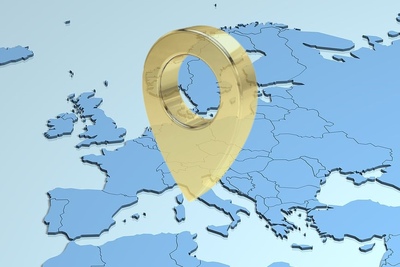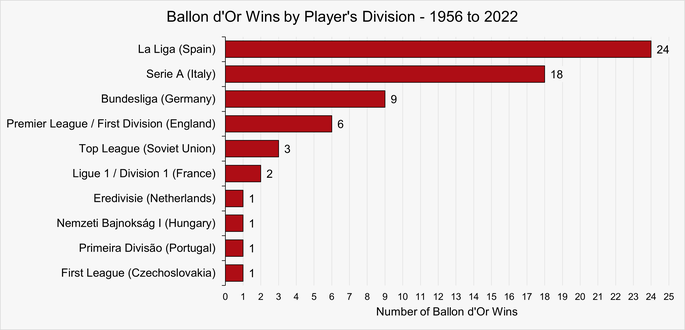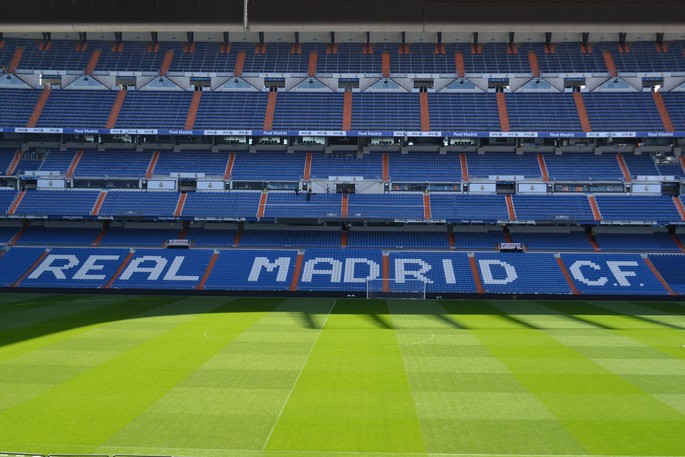 Football will always be a team sport first, made more impressive thanks to the occasional achievements of individuals. It is why which team wins the league or Champions League will always be more important than who finished as that season’s top scorer in each competition. That being said, the Ballon d’Or exists in order to give praise to the best player each year, such is the importance of individual contribution towards the overall achievement of the club that they play for. Some leagues are perhaps slightly more likely to produce winners than others, however.
Football will always be a team sport first, made more impressive thanks to the occasional achievements of individuals. It is why which team wins the league or Champions League will always be more important than who finished as that season’s top scorer in each competition. That being said, the Ballon d’Or exists in order to give praise to the best player each year, such is the importance of individual contribution towards the overall achievement of the club that they play for. Some leagues are perhaps slightly more likely to produce winners than others, however.
The reality is that what a player is doing in the Premier League or La Liga, for example, is going to be seen as more important than what is happening in the likes of the Russian top-flight. That is just how football snobbery works, with the major European leagues always likely to get more attention than those that are further down the pyramid. The fact that a player has won the Ballon d’Or playing in a league doesn’t mean that they are native to the country that the league is played in, of course, which is what adds a degree of excitement and intrigue to the process.
Quick Answer: Which Division has had the Most Ballon d’Or Winners?
Spain’s La Liga has had the most Ballon d’Or wins between 1956 and 2022 with 24. The next best league is Italy’s Serie A with 18, followed by Germany’s Bundesliga with 9.
Of the Spanish clubs, Real Madrid and Barcelona have both had 12 Ballon d’Or wins, Real Madrid with 8 different players, Barcelona with 6 different players.
The Best Player In Europe

Each of the top 100 ranked football nations has a representative journalist who will vote on the Ballon d’Or winner from a shortlist of players
When the Ballon d’Or was first conceived of in 1956, the aim was to declare the best player in the world at that time. It was presented by France Football, hence the reason the name of the award is French, although for a time it was merged together with the FIFA World Player of the Year award to become the FIFA Ballon d’Or. That was between 2010 and 2015, with the competition reverting to being simply the Ballon d’Or in 2016. It is considered to be the most prestigious award that an individual footballer can win, although some believe it is little more than a ‘popularity contest.’
The Ballon d’Or takes votes from a panel football journalists, with the vote being about who had been the best player from Europe over the previous year. It was down as the ‘European Footballer of the Year’ award for that reason. It was expanded to include players from anywhere in the world in 1995, provided they had played at a European club. For a brief period between 2010 and 2015, the captains and managers of national teams were also allowed to vote. In 2022, the rules changed so that the voting was about the best player of the season rather than the calendar year, with only those journalists representing the top 100 ranked countries voting.
The Top Leagues
When it comes to discussing the top leagues, it is complicated by the fact that the leagues have changed their names over the years. The Premier League was created out of the old First Division, for example, but is ostensibly the same thing as it is the English top-flight. Here is a look at the Ballon d’Or winner from each year, as well as the league that they were playing in at the time of the win:
List of Ballon d’Or Winners – 1956 to 2022
| Year | Winner | Club | League | Country |
|---|---|---|---|---|
| 2022 | Karim Benzema | Real Madrid | La Liga | Spain |
| 2021 | Lionel Messi | Paris Saint-Germain | Ligue 1 | France |
| 2019 | Lionel Messi | Barcelona | La Liga | Spain |
| 2018 | Luka Modrić | Real Madrid | La Liga | Spain |
| 2017 | Cristiano Ronaldo | Real Madrid | La Liga | Spain |
| 2016 | Cristiano Ronaldo | Real Madrid | La Liga | Spain |
| 2015 | Lionel Messi | Barcelona | La Liga | Spain |
| 2014 | Cristiano Ronaldo | Real Madrid | La Liga | Spain |
| 2013 | Cristiano Ronaldo | Real Madrid | La Liga | Spain |
| 2012 | Lionel Messi | Barcelona | La Liga | Spain |
| 2011 | Lionel Messi | Barcelona | La Liga | Spain |
| 2010 | Lionel Messi | Barcelona | La Liga | Spain |
| 2009 | Lionel Messi | Barcelona | La Liga | Spain |
| 2008 | Cristiano Ronaldo | Manchester United | Premier League | England |
| 2007 | Kaká | AC Milan | Serie A | Italy |
| 2006 | Fabio Cannavaro | Real Madrid | La Liga | Spain |
| 2005 | Ronaldinho | Barcelona | La Liga | Spain |
| 2004 | Andriy Shevchenko | AC Milan | Serie A | Italy |
| 2003 | Pavel Nedvěd | Juventus | Serie A | Italy |
| 2002 | Ronaldo | Real Madrid | La Liga | Spain |
| 2001 | Michael Owen | Liverpool | Premier League | England |
| 2000 | Luis Figo | Real Madrid | La Liga | Spain |
| 1999 | Rivaldo | Barcelona | La Liga | Spain |
| 1998 | Zinedine Zidane | Juventus | Serie A | Italy |
| 1997 | Ronaldo | Inter Milan | Serie A | Italy |
| 1996 | Matthias Sammer | Borussia Dortmund | Bundesliga | Germany |
| 1995 | George Weah | AC Milan | Serie A | Italy |
| 1994 | Hristo Stoichkov | Barcelona | La Liga | Spain |
| 1993 | Roberto Baggio | Juventus | Serie A | Italy |
| 1992 | Marco van Basten | AC Milan | Serie A | Italy |
| 1991 | Jean-Pierre Papin | Marseille | Division 1 | France |
| 1990 | Lothar Mattäus | Inter Milan | Serie A | Italy |
| 1989 | Marco van Basten | AC Milan | Serie A | Italy |
| 1988 | Marco van Basten | AC Milan | Serie A | Italy |
| 1987 | Ruud Gullit | AC Milan | Serie A | Italy |
| 1986 | Igor Belanov | Dynamo Kyiv | Top League | Soviet Union |
| 1985 | Michel Platini | Juventus | Serie A | Italy |
| 1984 | Michel Platini | Juventus | Serie A | Italy |
| 1983 | Michel Platini | Juventus | Serie A | Italy |
| 1982 | Paolo Rossi | Juventus | Serie A | Italy |
| 1981 | Karl-Heinz Rummenigge | Bayern Munich | Bundesliga | Germany |
| 1980 | Karl-Heinz Rummenigge | Bayern Munich | Bundesliga | Germany |
| 1979 | Kevin Keegan | Hamburger SV | Bundesliga | Germany |
| 1978 | Kevin Keegan | Hamburger SV | Bundesliga | Germany |
| 1977 | Allan Simonsen | B. Mönchengladbach | Bundesliga | Germany |
| 1976 | Franz Beckenbauer | Bayern Munich | Bundesliga | Germany |
| 1975 | Oleg Blokhin | Dynamo Kyiv | Top League | Soviet Union |
| 1974 | Johan Cruyff | Barcelona | La Liga | Spain |
| 1973 | Johan Cruyff | Barcelona | La Liga | Spain |
| 1972 | Franz Beckenbauer | Bayern Munich | Bundesliga | Germany |
| 1971 | Johan Cruyff | Ajax | Eredivisie | Netherlands |
| 1970 | Gerd Müller | Bayern Munich | Bundesliga | Germany |
| 1969 | Gianni Rivera | Milan | Serie A | Italy |
| 1968 | George Best | Manchester United | First Division | England |
| 1967 | Flórián Albert | Ferencváros | Nemzeti Bajnokság I | Hungary |
| 1966 | Bobby Charlton | Manchester United | First Division | England |
| 1965 | Eusébio | Benfica | Primeira Divisão | Portugal |
| 1964 | Denis Law | Manchester United | First Division | England |
| 1963 | Lev Yashin | Dynamo Moscow | Top League | Soviet Union |
| 1962 | Josef Masopust | Dukla Prague | First League | Czechoslovakia |
| 1961 | Omar Sívori | Juventus | Serie A | Italy |
| 1960 | Luis Suárez | Barcelona | La Liga | Spain |
| 1959 | Alfredo Di Stéfano | Real Madrid | La Liga | Spain |
| 1958 | Raymond Kopa | Real Madrid | La Liga | Spain |
| 1957 | Alfredo Di Stéfano | Real Madrid | La Liga | Spain |
| 1956 | Stanley Matthews | Blackpool | First Division | England |
Breaking it Down by League
Now that we have had a look at the winners of the Ballon d’Or over each of the years between 1956 and 2022, with 2020 missing as no award was given on account of the global health crisis of the time, it is worth taking a look at how many times each league was responsible for the winner of the trophy. Rather than splitting it up into, for example, the First Division and the Premier League as separate entities, we will instead group them together here.

Here we can clearly see that Spain’s La Liga has been dominant, producing 24 winners. Between 2009 and 2019, every award was won by a Barcelona or Real Madrid player.
Which Clubs Have Contributed The Most?

Real Madrid have had eight Ballon d’Or winning players, Photo by Daniel, flickr
The final aspect worth considering when we look at the leagues that have given us the Ballon d’Or winners over the years is which of the clubs within those leagues have been responsible for those winners. Have some clubs been more dominant in the Ballon d’Or standings than others? Is there an extent to which a player is more likely to win the Ballon d’Or if they play for one team than another?
Ballon d’Or Winners by Club – 1956 to 2022
| Club (Division) | Wins | Players |
|---|---|---|
| Real Madrid (La Liga) | 12 | 8 |
| Barcelona (La Liga) | 12 | 6 |
| AC Milan (Serie A) | 8 | 6 |
| Juventus (Serie A) | 8 | 6 |
| Bayern Munich (Bundesliga) | 5 | 3 |
| Manchester United (First Division & Premier League) | 4 | 4 |
| Inter Milan (Serie A) | 2 | 2 |
| Dynamo Kyiv (Soviet Top League) | 2 | 2 |
| Hamburger SV (Bundesliga) | 2 | 1 |
| Paris Saint-Germain (Ligue 1) | 1 | 1 |
| Liverpool (Premier League) | 1 | 1 |
| Borussia Dortmund (Bundesliga) | 1 | 1 |
| Marseille (Division 1) | 1 | 1 |
| Borussia Mönchengladbach (Bundesliga) | 1 | 1 |
| Ajax (Eredivisie) | 1 | 1 |
| Ferencváros (Nemzeti Bajnokság I) | 1 | 1 |
| Benfica (Primeira Divisão) | 1 | 1 |
| Dynamo Moscow (Soviet Top League) | 1 | 1 |
| Blackpool (First Division) | 1 | 1 |
Whilst there is certainly an argument that Cristiano Ronaldo and Lionel Messi skew the numbers a touch, it is clear that if you are a talented player hoping to win the Ballon d’Or then you’d be best served by playing in the Spanish top-flight. From that, you’d then to well to opt for Real Madrid in La Liga, given their 12 wins have come from eight players overall.
